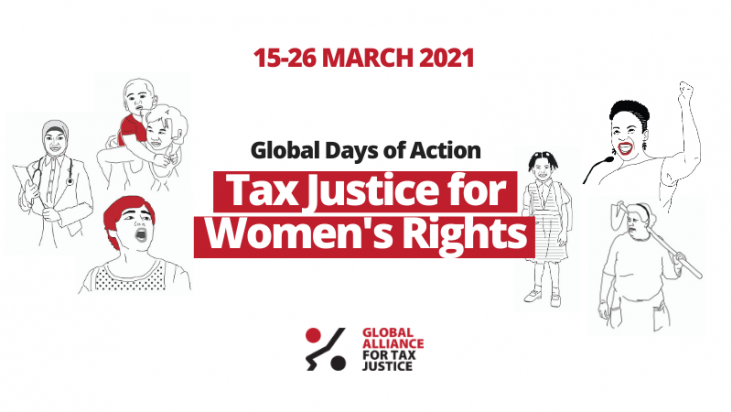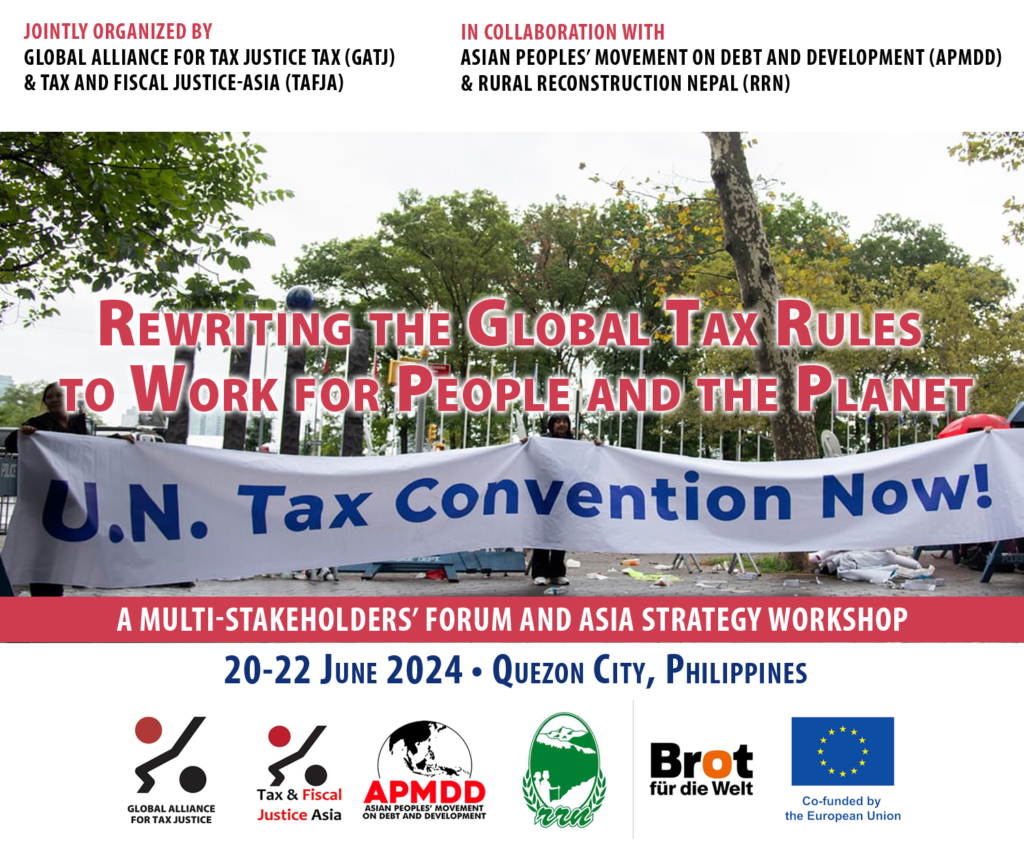CONCEPT NOTE
Context and Rationale
The COVID-19 pandemic has unleashed a crisis of multiple dimensions that is causing unprecedented and devastating impacts on lives and livelihoods around the world, especially in the Global South. Its impacts are not gender neutral because of pre-existing inequalities brought about by the current neoliberal and patriarchal economic system, which concentrates income, wealth and power in the hands of the wealthy elite, predominantly in the Global North. The socio-economic crisis triggered by COVID-19 has hit women the hardest because they make up the majority of unpaid care and precarious, low-paid and domestic work. The unbalanced response to the crisis is undermining the opportunity for all people to realise their human rights. Women experiencing multiple and intersecting discriminations – including those living in poverty or who are marginalised based on their gender, race, sexual orientation, physical ability, ethnicity, income, education, nationality or migration status – continue to bear the worst brunt of the crisis.
This crisis is exacerbating pre-existing structural inequalities, such as gender inequality in its different manifestations. For instance, women make up almost 70% of the health care workforce, exposing them to a greater risk of COVID-19 infection, while they are often under-paid and overworked. At the same time, women also shoulder much of the burden at home, given school and childcare facility closures and longstanding gender inequalities in unpaid care work. Women are more likely to lose their job and income, and face increased risks of violence, exploitation, abuse and harassment during this time of crisis and quarantine. And yet, the response and recovery measures to the current pandemic are blind to women’s needs and revolve around extending and expanding tax incentives, cutting corporate tax rates and different forms of bailouts that are justified as being key measures to keep the economy going. For many countries, austerity measures and budget cuts are back in place, reducing the resources available for public services that should be in place to ensure women’s rights.
The Global Alliance for Tax Justice (GATJ) believes that the policy responses so far are shaping up to be mostly debt-financed, corporate-driven and unresponsive to gender dimensions – ignoring human rights obligations and anti-discrimination law under Convention on the Elimination of all Forms of Discrimination Against Women (CEDAW). They are not prioritising public health, social protection and other human rights in rebuilding just and sustainable societies and economies. Even though challenges may differ from region to region, there are clearly linked patterns and trends, especially in terms of tax issues, such as: the global dominance in tax rule-making institutions based in the Global North, led by the Organisation for Economic Co-operation and Development (OECD); the impunity of large corporations in profit-shifting and illicit financial flows; the bailouts of corporations during the COVID-triggered crisis; and the raising of revenues for COVID-19 responses through regressive means. All this means less money is available for public spending that is vital to stem the tide of rising inequality and build back a more rights-based and gender-equal economy.
During the pandemic, millions of people are being pushed into extreme poverty and hunger – including a disproportionate share of women. At the same time, many corporations and wealthy individuals have accumulated more profits and wealth during the pandemic-triggered crisis. A broken international tax system continues to enable opaque legal structures and entities to facilitate illicit financial flows and tax abuse by the wealthy elite and multinational companies, enabling extraction and distribution of wealth and property into the hands of few. This deprives governments of much-needed resources to fund public services such as health, education, social protection and infrastructure to address the impacts of the COVID-triggered crisis.
Regressive and discriminatory tax policies being used to raise government revenues continue to have negative impacts on poor people, especially women. In addition, unpaid care and domestic work that is disproportionately carried out by women remains invisible in the economy. It is a State responsibility to provide public services that ensure the rights of children, elders, people with disabilities and those who are sick. Existing gaps in insufficient social protection systems that largely exclude informal workers and care infrastructure have intensified care burdens for women, reinforcing patriarchal gender norms. Women are taking on a larger share of additional unpaid care work during the pandemic, yet public policy solutions have not been taken forward, leaving these women facing economic insecurities and overwhelmed with care activities and social security concerns that should be the State’s responsibility
It is more urgent than ever for governments to implement structural reforms that uphold redistributive justice, including equal and progressive reforms in tax systems. The wealthy elites and large corporate conglomerates must pay their share of taxes in jurisdictions where their profits are created. It is an opportune time for the tax justice movement across the world to shed light on alternatives to the current economic model that would enable progressive feminist approaches and tax justice agendas to thrive at different levels – nationally, regionally and globally.
Global Days of Action (GDOA)
GATJ, in collaboration with its regional networks and partners, will hold the 5th annual Global Days of Action for Tax Justice for Women’s Rights from 15 to 26 March 2021 under the banner call: “Make taxes work for women”. The previous GDOA editions have been ground-breaking in mobilising tax justice and women’s rights activists and campaigners to work together. This year’s GDOA is all the more significant as it takes place in the midst of the pandemic-triggered worldwide crises, highlighting the urgency of making tax work for women, who have been hit hardest by these crises.
The campaign banner provides a unified direction to guide and galvanise continuous collective action throughout the days of action and beyond. Through the GDOA, we will aim to build solidarity not only among women, but also among different sectors across the world to effectively advance our shared message that urgent action for tax justice and gender justice is needed NOW. The GDOA will aim to facilitate bringing together the global tax justice and the women’s rights movements and organisations in raising the call to urgently make taxes work for women in the realisation of gender equality and empowerment of women and girls. This will be done through globally coordinated actions that show the collective power of women to achieve greater visibility and impact. The GDOA will also serve as an opportunity to highlight the tax issues affecting women; to integrate tax justice as part of the broader struggles for gender equality and women’s rights; and to make tax justice more relevant by amplifying the voices of real people.
The campaign will:
- have a promotional public-facing peak on 8 March, during International Women’s Day (IWD). showcasing women’s relentless fights and struggles for survival, rights and tax justice;
- continue until 26 March to coincide with the 65th Session of the United Nations Commission on the Status of Women (UNCSW) on 15-26 March; and
- overlap with the International Monetary Fund (IMF)/World Bank (WB) virtual Civil Society Policy Forum (CSPF) on 22 March to 15 April.
The UNCSW and the CSPF are key strategic advocacy opportunities and spaces to engage and enter into dialogue with policy-makers on tax issues affecting women. Complementing the national and regional actions around IWD, these meetings will provide a critical opportunity to advance our united call on governments: to maximise available resources through fair and progressive taxation to fund gender-responsive public services and social protection systems while ensuring the equal participation of women in decision-making – including financial and economic decisions for achieving gender equality.
IWD is a global day celebrating the social, economic, cultural and political achievements of women and demanding women’s rights and equality. While the UN picked the hashtag #ChooseToChallenge for this year’s theme, we underscore that women have never stopped challenging and resisting injustices. IWD itself is a victory won by struggles waged by women (especially women workers) in the past. In today’s world, as women around the world fight for survival in their daily lives, women are also engaged in collective struggles that build their power to fight for gender justice, tax justice and economic justice. Because of the COVID-19 restrictions, IWD may or may not be celebrated in the streets, depending on the social distancing restrictions nationally. However, collective actions will remain alive, for instance, through the GDOA, as women find creative ways to make their voices heard – online, in public spaces (where allowed) or in national, regional and global advocacy spaces.
Our objectives:
- Reach out and partner with women’s rights organisations to express global solidarity between the tax justice movement and the women’s movement in the fight for a progressive tax and economic system that works for all women to overcome the COVID-19 triggered crises.
- Raise awareness of tax justice as essential to fulfil women’s rights and achieve gender equality.
- Mobilise and strengthen the power of tax justice activists through coordinated actions, to influence policy-makers at all levels to adopt reforms in tax policies and practices that promote gender equality and women’s rights.
- Call on States’ obligations and the responsibility of multilateral institutions to stop tax abuses and illicit financial flows, and the duty of multinational corporations and wealthy elites to pay their fair share of taxes.
Our demands:
Given the COVID-19 multidimensional crises and the need overcome them, we urge multilateral institutions and national governments to:
- Ensure that tax and fiscal policies recognise, represent, reduce and redistribute unpaid care work, including by constructing national care work policies.
- Reduce unfair tax burdens on women and adopt progressive, redistributive and gender equal taxation – including new forms of taxation of capital and wealth – combined with less reliance on consumption taxes.
- Remove gender bias and discrimination in tax policies to ensure that tax revenues are raised and spent in ways that promote gender equality.
- Ensure adequate financing of gender-responsive social services that promote women’s rights, and reduce inequalities, including by gender budgeting.
- Establish an inclusive intergovernmental UN Global Tax body, to ensure equal taxing rights of nation states and stop all forms of tax abuse by multinational corporations and the wealthy elites.
Ways of working:
- The days of action will be organised and coordinated by GATJ and led by its regional networks around the world – Tax Justice Network Africa (TJNA), Tax and Fiscal Justice Asia (TAFJA), Tax Justice Europe (TJ-E), Red de Justicia Fiscal de América Latina y el Caribe (RJFALC), FACT Coalition and Canadians for Tax Fairness – in close collaboration with partners and the GATJ tax and gender working group.
- Regular calls will be held to ensure effective preparation for and implementation of the GDOA.
To take part in the Global Days of Action, get in touch with:
Global Alliance for Tax Justice: Caroline Othim (caroline@globaltaxjustice.org), Grazielle David (grazielle@globaltaxjustice.org), Lays Ushirobira (lays@globaltaxjustice.org)
Tax Justice Network Africa: Chenai Mukumba (cmukumba@taxjusticeafrica.net), Cynthia Umurungi (cumurungi@taxjusticeafrica.net), Farah Nguegan (fnguegan@taxjusticeafrica.net)
Red de Justicia Fiscal de América Latina y el Caribe: Adrián Falco (adrianfalco@fundses.org.ar)
Tax and Fiscal Justice Asia:
FACT Coalition: Erica Hanichak (ehanichak@thefactcoalition.org)
Canadians for Tax Fairness: Erika Beauchesne (erika.beauchesne@taxfairness.ca)
Tax Justice Europe: Olivia Lally (olally@eurodad.org), Tove Maria Ryding (tryding@eurodad.org)




